Superman: The Movie Review
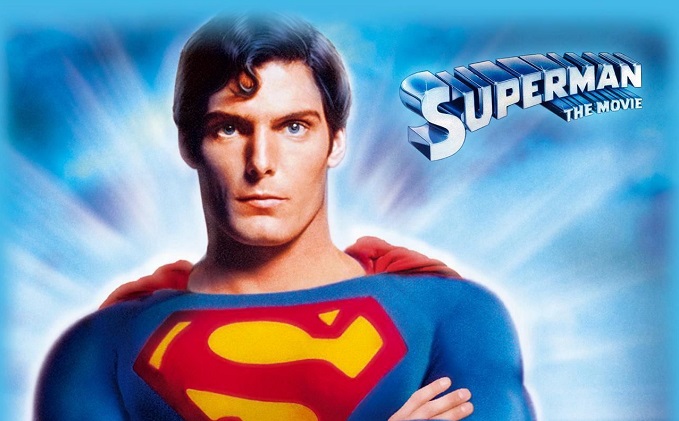
The Plot:
Christopher Reeve takes on the role of one of DC Comics’ most beloved superheroes in this 1978 origin story. Just before his home planet, Krypton, is destroyed, Jor El saves his newborn son, Kal El, by sending him away to planet Earth. There Kal El is raised as Clarke Kent and thanks to his superhuman powers, soon becomes the saviour of the world fighting for peace, justice, and the American way.
The Good:
From the very beginning it is clear that director Richard Donner wants to stay true to the comic book origins of the Superman story. After its opening sequence of a comic book narration the film moves swiftly on to give what is surely one of the greatest themes in film history. John Williams’ score played over the opening credits will surely set you up for what is truly a remarkable comic book adaptation.
Christopher Reeve’s portrayal as the Kryptonian superhero is pitch perfect with his ability to switch between the vastly different characteristics of both Superman and his alter-ego Clark Kent, offering both a serious role and a bit of comic relief thrown in for good measure as Kent stumbles around the place trying his hardest to look absolutely nothing like the cool, calm and collected Superman.
Gene Hackman’s Lex Luthor is just as good as the antagonist with his constant vanity and sheer determination on destroying the world in true villain style. Although it’s nothing like the villains we’re so used to in todays super hero movies it sits neatly in between that of the ultra camp 1960s Batman film and the current era of serious toned, more realistic adaptations.
The set pieces and ground breaking visual effects that aid the film, make Superman an easily rewatchable blockbuster which even nearly 35 years later can still entertain.
The Bad:
Not much can bring this film down really, but one of its few low points is perhaps its lenghty running time. At nearly two and a half hours long, the film could have been easily cut down by about twenty minutes or so. It may even have been possible to make a few additions to the story while still resolving things more quickly. That being said, the storyline is just what was needed to set up the franchise. Nothing too heavy, but not too light, perfectly balanced in between.
The Ugly Truth:
With a stellar cast and brilliant set pieces Superman: The Movie is the perfect way to bring such a classic story to hollywood, especially in the time of release. The years that have passed haven’t lessened the film much if at all, and still proves to be an exciting two and a half hours. From the second you hear the beautiful tune of John Williams’ score accompanied with the majestic opening credits sequence you’ll most definitely be hooked.
Black Rock Review
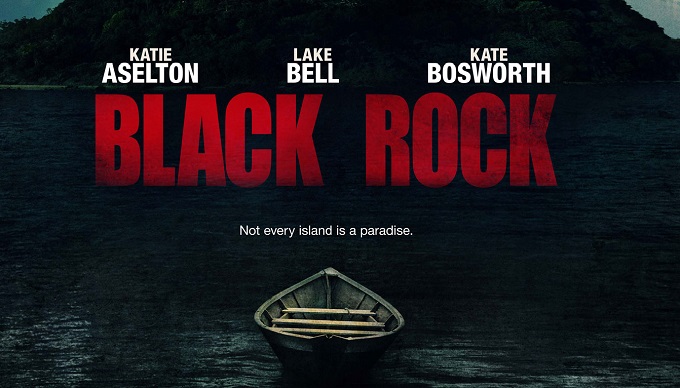
The Plot:
Three young women take a camping trip to the remote island they visited as children to reconnect and set aside their personal issues. However, they soon discover that the island is not quite as deserted as they thought. After encountering a trio of seemingly friendly hunters, the girls soon find themselves locked in a terrifying battle for survival.
The Good:
Lake Bell, Kate Bosworth and Katie Aselton are likeable performers that do their best to inject actual personalities into their characters, especially during the film’s opening set up. The film at least bothers to try and give its heroines some mundane drama and backstory before it plunges them into an implausible nightmare. It’s not much, but it’s more than a lot of truly awful and unwatchable horror films manage.
Male genre fans will no doubt also be pleased that the film conveniently discovers a flimsy excuse halfway through to have its pretty stars strip completely naked. It might be heavy handed fan-service but it’s well timed to peak waning interests.
Although there’s just about enough gore once the trouble really starts to keep hardened horror fans vaguely satisfied, the film doesn’t really linger on its grisly moments, like so many low budget genre movies do in an effort to be memorable and notorious. Even squeamish audiences should be able to easily brave their way to the end without too much trouble. Perhaps that’s not necessarily a desirable compliment for a true horror film.
The Bad:
The Horror genre is stereotypically guilty of generic clichés and sadly Black Rock takes a well a worn premise that feels predictably familiar and fails to add as much originality as it clearly hoped to.
Iconic 1970s film Deliverance infamously dealt with the concept of encountering violent gun wielding lunatics in a remote wilderness and his has since inspired endless lazy re-tellings. Black Rock joins the ranks of this sub-genre but does little to distinguish itself beyond making its endangered heroes women. A simple gender swap isn’t really enough on its own to turn a by the numbers tale into anything more sophisticated or intriguing.
The film’s plot is essentially a glorified game of murderous hide and seek, played out on an unfortunately small island located a little too close to civilisation. Finding a more expansive and convincingly remote setting would have made the film’s cat and mouse antics a little more plausible. Although it really doesn’t help that the film’s traumatized heroines seem to insist on casually strolling around the woods and bickering loudly, whilst supposedly hiding from deadly trained killers.
Horror films often ask audiences to suspend disbelief as characters make irrational decisions that sacrifice common sense to serve the plot. But Black Rock frequently asks far too much. Plot holes and implausible silliness instantly evaporates any real sense of tension. Watching the girls take breaks from being terrified to slap each other and squabble over boyfriend dramas is especially disheartening.
A great horror film also ideally needs a great villain. It takes a convincingly menacing threat to deliver an exhilarating rush of fear. Sadly Black Rock only delivers lazy stereotypes and inadequately bland actors. The film aims to be more tense than grotesque, but it just doesn’t pack enough psychological and emotional punches. It’s difficult to emotional invest when characters face unimaginative and predictable perils.
Though some fans may find the unnecessary nude scenes at least distracting it does suggest either a misplaced confidence or resigned desperation from director/star Katie Aselton. Despite Aselton’s presumably best intentions the film ultimately falls into many of the most obvious genre clichés.
The Ugly Truth:
Black Rock is watchable horror fare that fails to live up to other better versions of its familiar premise. Seasoned horror fans will perhaps be especially disappointed that the film fails to deliver either genuine scares or generous buckets of blood. It’s never entirely awful, but it could so easily have been so much better.
Summer In February Review
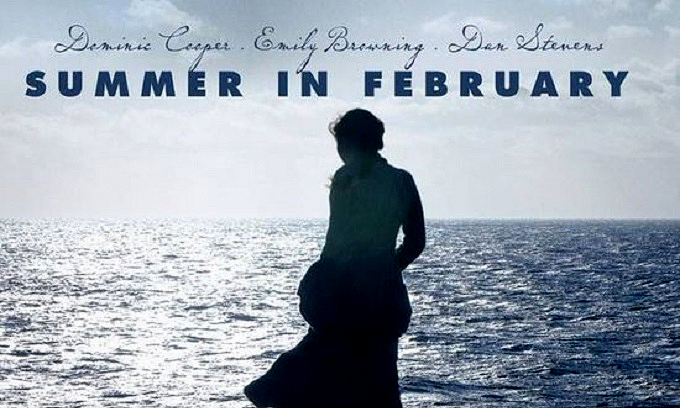
The Plot:
When a beautiful young woman moves into a lively Edwardian artist colony in Cornwall she finds herself caught up in a passionate love triangle between wild artistic genius Alfred Munnings and handsome soldier Captain Gilbert Evans.
The Good:
Based on actual events and real people, Summer In February is a slow burning period drama set against a lush Cornish seaside landscape. The film’s visuals are both sumptuous and seductive, taking full advantage of the dramatic scenery of constantly crashing waves and wind swept cliff tops. It also adds an ominous inevitability of brooding melodrama. Gentle cinematography, ornate costumes and a pretty natural backdrop gives the film a particular breed of rustic glamour.
Australian starlet Emily Browning brings a convincingly fragile English rose beauty and polished plummy accent to the role of Florence. It’s entirely understandable that she has two very different men both vying for possession of her porcelain doll features. She also handles the requisite mood swings from blissful happiness to hysterical despair quite well.
Dominic Cooper has a rare gift, for looking pleased with himself. Playing a caddish womanising artist he consistently beams with that typical smug satisfaction. He’s effectively typecast, flirting as usual with the finest line between charming and obnoxious. Downton Abbey star Dan Stevens, armed with foppish hair and polite clipped tones, is a welcome contrast and likeably banal love rival.
The film’s attractive central trio do their very best to manufacture some genuine chemistry; creating plausible flashes of friendship, love, jealousy and betrayal amongst themselves.
The Bad:
Though much beloved in the UK, the slow paced subtleties of 1920’s period drama aren’t of course universally appealing. Compared to the satisfyingly explicit passions of contemporary romantic drama the polite restraint and languid pace of these proceedings won’t ignite everyone’s interest.
If you typically loath formal melodramatics then you will likely be frustrated by a collection of characters who fabricate complex social problems entirely thanks to an irrationally steadfast refusal to acknowledge or discuss their emotions. It’s difficult to witness attempts at happiness that flounder needlessly as obvious solutions are ignored merely to observe antiquated social niceties.
Whilst the film successfully captures the look of iconic period drama, it ultimately fails to deliver quite enough smouldering undertones of passions or feel-good romantic satisfaction.
The Ugly Truth:
After a bright opening full of brisk walks, poetry and sprinklings of romantic charm; Summer In February gradually turns more sullen and sombre. A well composed production boasting handsome scenery and pretty stars lends the film a little more elegance than its occasionally heavy handed Mills and Boon style plot. It should be perfect for melancholy fans of weepy romantic page turners, but won’t warm colder hearts.
The Purge Review
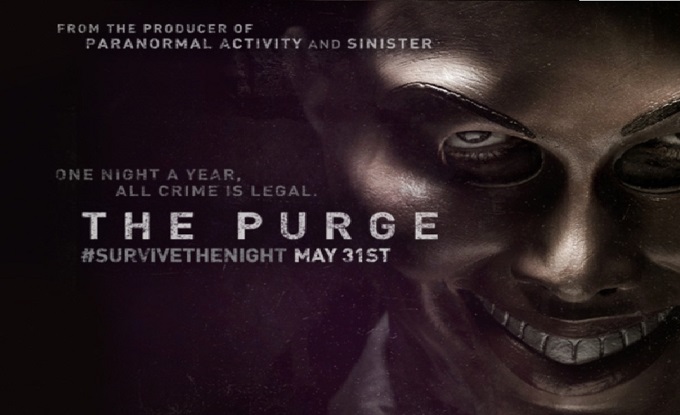
The Plot:
In 2022, America has become a 100% crime free country. That is apart from one night each year, known as The Purge, where, for 12 hours all laws can be broken and chaos can ensue. As a security system salesman James Sandin (Ethan Hawke) gathers his family together in the safety and comfort of their barricaded home for the night, things turn ugly when his son decides to become a good Samaritan.
The Good:
Perhaps the most interesting part of The Purge is its initial premise. The concept of a world where all laws are put on hold for a single night to cleanse the human race of their supposed animalistic tendencies is certainly intriguing.
During the film’s persuasive opening, it almost convinces you that the idea might make some sort of sadistic sense, providing an extreme solution to escalating crime rates and collapsing global economies. However, the film quickly slams into some inevitable moral dilemmas.
When the family opens their tightly locked house to allow a desperate man to escape his would be murderers, it sets up a deadly game of cat and mouse. The family must hunt down their newfound ‘guest’ and return him to the determined gang of maniacs lurking outside, or risk a similarly grisly fate for themselves.
Whilst the opening act sets the film up nicely, it’s really this increasingly vicious second act which delivers meatier food for thought. Provocative questions are raised as the family’s young children start to realise that even their loving parents could quickly turn to violent murder given sufficient motivation.
The Bad:
The Purge begins with a promising idea but fails to find a plot to match that initial intrigue. Disappointingly the origins of The Purge are barely explored and instead the film’s sole focus seems to be simply whether such a horrific social experiment might work. Although it is a good bit of fun with enough gore to keep horror fans entertained, it still feels like a missed opportunity to tell a better story. Whilst this family ordeal is presented well enough to make it slightly (albeit worryingly) realistic, it might have been better to discard such petty details and aim for a bigger story.
Leading man Ethan Hawke holds the film up adequately, but doesn’t have much opportunity to truly shine. This is particularly disappointing after his impressive display in last year’s horror hit Sinister. As for the rest of the cast (mainly consisting of James’ wife, Mary and kids Charlie and Zoey) they unfortunately have even less to work with.
Perhaps the film’s most frustrating disappointment is the handling of the unnamed leader of the homicidal gang, played by Home And Away star Rhys Wakefield. Wakefield’s presence alone is fantastic and yet his character sadly isn’t. Failing to give him sufficient storyline or screen time needlessly squanders the opportunity to give the film a memorable villain.
The Ugly Truth:
The Purge entertains enough for its brisk 85 minute running time and horror fans won’t be disappointed by the standard mix of gore, tension and trauma. It might also particularly interest fans who saw 2008 slasher effort The Strangers and were left with an appetite for more. The Purge boasts a core concept that might be strong enough to start a franchise, but a more carefully considered and original plot would definitely be needed for any worthwhile sequel or prequel.
The Bling Ring Review
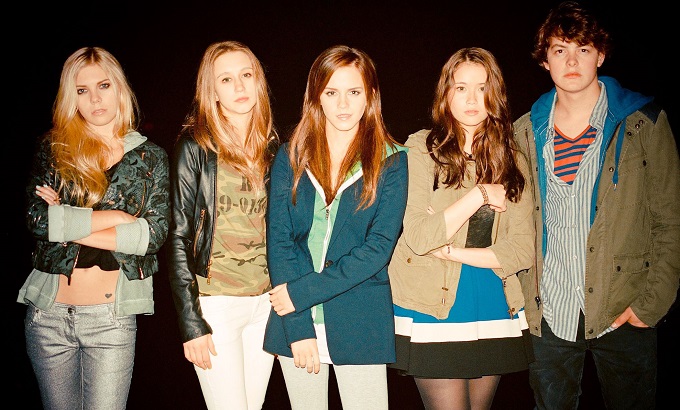
The Plot:
Based on real life events and inspired by a Vanity Fair article, The Bling Ring tells the story of a group of celebrity obsessed Californian teenagers who went of a $3million crime spree by burglarizing the homes of wealthy Hollywood stars like Orlando Bloom, Megan Fox, Paris Hilton and Lindsay Lohan.
The Good:
Director Sofia Coppola combines a typically well-chosen soundtrack with knowingly flashy visuals to paint a garish portrait of self-entitled adolescents utterly fixated on fame and material pleasures. The overall result is a mostly fun ride that sprinkles humour and cynicism in among piles of luxurious designer handbags and fashionably uncomfortable looking shoes. The film feels like a hedonistic plunge into the lurid waters of envious desperation and misguided teen angst.
In a cast of freshly discovered newcomers, Emma Watson is the only recognizable member of the actual Bling Ring burglary gang. She actually holds her own surprisingly well among the carefully selected cast, successfully transforming from prissy Hermione into a pouting wannabe Hollywood princess. Those unconvinced by the pretty Harry Potter starlet’s acting credentials will at least have to acknowledge her mastery of a nasal American drawl that is both perpetually disinterested and instantly contemptible.
It’s actually newcomers Katie Chang and Israel Broussard that take center stage as the ringleaders of the pubescent burglary gang. They give convincingly unlikable but at least understandable performances as the casual criminal masterminds. Leslie Mann also provides some nice comic moments as an amusingly atrocious mother, home schooling her brattish children with cringe worthy self-help mantras and homemade shrines to Angelina Jolie.
At best the film is a well-timed warning about the inherent dangers of unrestrained greed for beautiful things and beautiful people.
The Bad:
Anyone watching The Bling Ring simply for a sneaky glimpse inside the lavish supposed homes of Hollywood stars or because of the promise of actual celebrity cameos will likely be left unsatisfied. Real life victim Paris Hilton and Kirsten Dunst might have made the cast list, but they grace the screen for a matter of split seconds. Such audiences might also feel increasingly awkward as the film plays out the grim consequences of taking vapid celebrity obsessions to extremes.
It’s a little ironic that the main allure of a film making a thinly veiled attack on a pervasive culture of greed, excesses and celebrity is actually a graphic depiction of crimes sensationalized purely by their famous victims. The harshest critics might even argue that deliberately ‘glamourizing’ these real life events on screen is part of the precise problems the film laments in its later stages.
There’s a clear risk that audiences may also find the selfish self-entitlement of this juvenile gang of thieves simply too obnoxious to be understood or tolerated for prolonged periods. Even if you give the film credit for being a knowing satire, the inability to slap it’s protagonists in the face may still frustrate you.
The Ugly Truth:
The Bling Ring grabs and effectively holds audience’s attention with a well compiled mash of lurid sights and sounds, but for all its simulated glamour it remains at heart a simple cautionary tale. However, it is a little unclear if the moral of this enjoyably trashy tale is to avoid obsessive star struck greed or simply to avoid committing grand theft. Overall the film is a willfully guilty pleasure. Fueled by Gucci envy, gangster flavoured pop music and a seriously misplaced American dream.